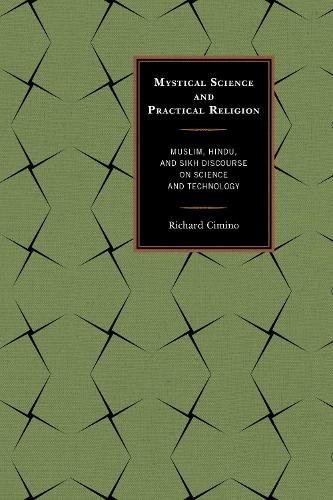
Mystical Science and Practical Religion: Muslim, Hindu, and Sikh Discourse on Science and Technology
(Hardback)
Publishing Details
Mystical Science and Practical Religion: Muslim, Hindu, and Sikh Discourse on Science and Technology
By (Author) Richard Cimino
Bloomsbury Publishing PLC
Lexington Books
9th September 2014
United States
Classifications
Tertiary Education
Non Fiction
Islam
Hinduism
Sikhism
Comparative religion
201.65
Physical Properties
Hardback
112
Width 161mm, Height 236mm, Spine 14mm
318g
Description
Mystical Science and Practical Religion examines the religious discourse employed by Muslim, Hindu, and Sikh applied science professionals and students, mainly engineers and Information Technology (IT) workers. Although applied scientists, especially immigrants to the United States, have shown high rates of religiosity, there have been few studies of this subject. Based on interviews with forty-five professionals and students, Cimino finds that although they are from different faiths, these applied scientists share a common discourse that blends religion and science. They each view their religions as the most scientific. Their work and study reshapes how they practice and conceptualize their faiths, though not in the expected directions of secularization and fundamentalism. This book provides a unique look at how the much contested fields of science and religion interact in real life.
Reviews
The biggest contribution of this book is to undermine the notion that there is some abstract science and-religion relationship at all. . . .As an illuminating account of the lived experience of religion and science among an understudied population, this book would be a useful and even necessary addition to a university library. * American Journal of Sociology *
Sociologists, philosophers, and scientists themselves have struggled with the idea that science is value free in its practice yet value laden in its effects. Scientists who are also religious believers, it seems, have much less difficulty with this idea because they apply a conceptual framework that circumscribes the value of science for their own lives and for the meaning of life more generally. The striking feature of Richard Ciminos book is its focus on non-Christian religious scientists, whose faith positions incline them toward mysticism but in ways that only serve to enrich their scientific practice. The book is a welcome correctiveto the false science-religion divisions that permeate both popular and academic culture today. -- Steve Fuller, Auguste Comte Chair in Social Epistemology, University of Warwick, author of The Intellectual
Mystical Science and Practical Religion is well written, provocative, and informative. Ciminos style is clear and not overly didactic. He analyzes and argues against Webers secularization thesis that the increase of science and technology will be deleterious to religion. The book will appeal to specialists in religion and science studies, as well as those interested in the sociology of minority religions in the United States. -- John Caiazza, Rivier University
Science and religion have a corrosive relationship, or at least that is a common assumption. Richard Ciminos research radically disrupts that taken-for-granted assumption. Through in-depth interviews with migrant engineers and IT professionals from three religious traditions, he shows how there is no conflict between religion, applied science, and the spirit of pragmatism. While there were cultural differences between Hindu, Muslim and Sikh scientists, the new knowledge class shared a pan-religious-scientific discourse. At the same time, these educated global citizens are transforming their religious traditions in the direction of American religiosity with its emphasis on individualism, spirituality, and practical relevance. Applied scientists thus become the conduits between religious traditions and the host society producing a complex blend between religious orthodoxy and American culture. Cimino provides a valuable contribution to the modern sociology of religion. -- Bryan S. Turner, The City University of New York
Author Bio
Richard Cimino is visiting lecturer of sociology at the University of Richmond and founding editor of Religion Watch, a monthly publication reporting on trends and research in contemporary religion.
